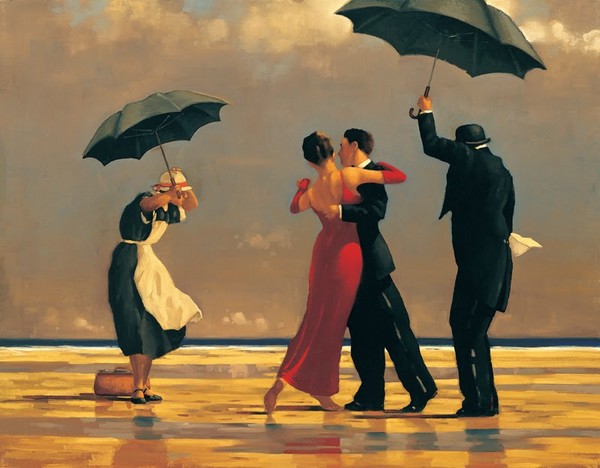
Imagine the last scene in a "made in Hollywood" movie: the main character is a singer who had many ups and downs in his life; now, he is on the platform of a crowded concert hall. Our man sings a piece of music that ends in a long fortissimo high note and the audience rises and gives him a standing ovation, ignoring the last chords of the piano. What would be the soundtrack of this scene? It could be Ein Traum, by Edvard Grieg, a song that has all the necessary elements to attract even the more reluctant cinema spectators, while the song lovers enjoy it from the first note.
Grieg composed Ein Traum in August 1889 and published it as the last of Seks Sange, Op. 48. This collection of six lieder from six different poets was the first one published in German for 25 years and includes some of his best-known songs: Dereinst, Gedanke mein, Zur Rosenzeit and, of course, Ein Traum. No doubt that the language contributed to its diffusion, but their musical worth is nothing to be sneered at.
The poem Ein Traum was written by Friedrich Bodenstedt. It has five stanzas that relate a dream and how this dream comes true. The scenario of both dream and reality is a glade in a spring day; despite that, I'm illustrating this post with a scene on the beach. It's just an association of ideas; everything in the painting is so unreal that it always makes me think of a dream. The song begins piano; the voice tries to explain his dream with calmness, but he can't hide his excitement: there's a rest after every phrase and he can't prevent his voice from rising at some moments. At the third stanza he tells us that his dream came true, and he begins to let himself go; His phrases are more varied, the dynamics change but he can still control them and return to piano.
If the main character of the movie were the pianist he wouldn't play a song; he would play... let's say something by Liszt, such as Mazzepa? The song-lovers, however, realize promptly that he holds the key of the song, from the initial piano to the final strepitoso (impetuous). While the left hand plays continuous arpeggiated triplets, the right hand repeats long and low notes at first; then, long and high notes; at the third stanza it adds some movement and now, at the fourth one, the arpeggios and the long notes become chords, more and more complex, until the end of the song. The character of the piece has changed so much during the last two stanzas that we hardly realize that the singer went back to his first phrases, now without concealing his feelings, on the contrary; just pay attention to the passionate repetitions of "nimmermehr" (never again) that precede them. After the high note marked with a fermata, the first syllable of "Wirklichkeit" (reality), the piano tells us the final ecstasy.
Ein Traum is a captivating song. Its progression from the contained calm to the fervour of the last bars is irresistible; As I said earlier, it would be a good choice for the final scene of our imaginary film. Its main character would be a tenor, but we're listening to Ein Traum sung by a baritone. This time it's not because of my baritonephilia; This time it's because this post is a birthday gift for my friend A, and the only possible version is that of Gerald Finley and Julius Drake (a great performance, needless to say).
Happy birthday, A!
Mir träumte einst ein schöner Traum:
Mich liebte eine blonde Maid;
Es war am grünen Waldesraum,
Es war zur warmen Frühlingszeit:
Die Knospe sprang, der Waldbach schwoll,
Fern aus dem Dorfe scholl Geläut'-
Wir waren ganzer Wonne voll,
Versunken ganz in Seligkeit.
Und schöner noch als einst der Traum
Begab es sich in Wirklichkeit --
Es war am grünen Waldesraum,
Es war zur warmen Frühlingszeit:
Der Waldbach schwoll, die Knospe sprang,
Geläut' erscholl vom Dorfe her --
Ich hielt dich fest, ich hielt dich lang --
Und lasse dich nun nimmermehr!
O, frühlingsgrüner Waldesraum!
Du lebst in mir durch alle Zeit!
Dort ward die Wirklichkeit zum Traum,
Dort ward der Traum zur Wirklichkeit!
I once had a beautiful dream:
I was in love with a fair-haired young woman,
we were in a green forest glade,
it was warm spring weather,
the buds were sprouting, the brook was running strong,
the sounds of the distant village could be heard,
we were full of joy,
immersed in bliss.
And even more beautiful than the dream
was what occurred in reality:
it was in a green forest glade
it was warm spring weather,
the buds were sprouting, the brook was running strong,
the sounds of the distant village reached our ears --
I held you tight, I held you long,
and now will never again let you go!
Oh the spring-green glade
is alive in me for all time!
That is where reality became a dream
and the dream became reality!
(translation by Peter Low)













Comments powered by CComment